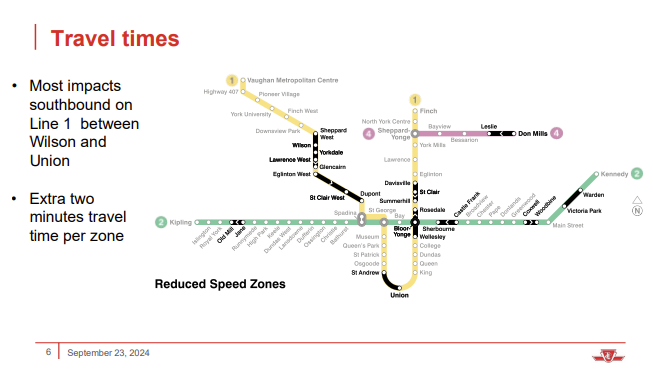Advocates are raising concerns that a web of restricted speed zones across Toronto’s transit network is making slow subways the city’s “new normal” as the rail system shows its age.
The TTC has introduced restricted speed zones for trains in places where “certain defects have been documented” in order to reduce the wear and tear suffered by older portions of the track.
A survey completed by the transit in May launched a new round of restricted speed zones, with 18 new spots on Line 1: Yonge-University and seven on Line 2: Bloor Danforth. The TTC said that, since then, 65 of the 85 zones have been removed with repairs and upgrades.
Since 2023, there have been a total of 296 reduced speed zones across the TTC’s subway lines.
The advocacy group TTC Riders, however, said the number of slow zones was “unprecedented” and impacting the usefulness of the network for commuters.
“It’s better to be safe than sorry, but it is not OK for slow subways to become our new normal,” the group said in a statement to Global News.
“We are glad the TTC is taking safety seriously and inspecting subway tracks more frequently, but the large number of slow zones and long repair timelines raise questions about whether the TTC has enough resources to do proper maintenance and repairs.”

Get daily National news
Get the day’s top news, political, economic, and current affairs headlines, delivered to your inbox once a day.
A recent TTC report said the biggest impact on the subway was for those travelling southbound from Wilson Station to Union Station on Line 1. A map shows seven slow zones in place between the two stations adding two minutes per zone — for a total delay of just over 14 minutes on a single journey.

A map of Toronto subway restricted speed zones.
TTC
“While we do realize the negative impacts of these restricted speed zones have on our customers due to the increased travel times, I want to assure customers that the TTC rail is safe,” a senior TTC staffer told the agency’s board on Sept. 24.
“I do want to stress, though, that we are accurately aware of the impact on our customers and we’re working hard to correct the issues and get the speeds back to normal as soon as possible.”
The age of the TTC’s subway lines has been a growing political concern, particularly since the Scarborough RT derailed in the summer of 2023.
The now-closed Line 3 saw a train derail after being pushed to the very edge of its useful life, with several injured in the incident. After the crash, the agency opted to bring forward the line’s closure and took the route out of service.
After that report, the TTC’s then-CEO said the agency would need $25 billion to fix and replace its existing assets over the next 15 years alone.
The trains running on Line 2, in particular, have been a focus of growing concern and advocacy from the city. The aging fleet is in desperate need of repair, something the provincial government has agreed to help with if Ottawa also steps up.
“I am very concerned about the lifespan of the Bloor subway cars, it is getting very old and it takes a while for us to get new ones and for new ones to get constructed,” Toronto Mayor Olivia Chow said last fall.
In the meantime, while work moves ahead on the Ontario Line, Eglinton Crosstown LRT and Finch West — which will all add brand new transit to the city’s stock — officials are working on short-term fixes like reduced speed zones.
“The TTC needs enough resources to keep the system safe and well-maintained,” TTC Riders insisted, calling on the provincial and federal governments to step in and help the city out.
© 2024 Global News, a division of Corus Entertainment Inc.
#Delicate #track #TTC #means #slow #subways #normal #advocacy #group #worries







